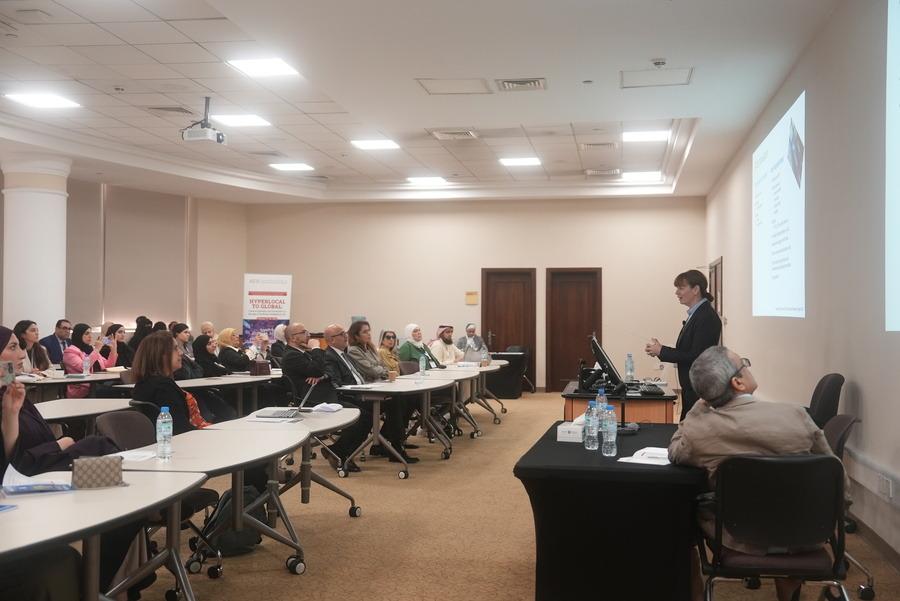- About
- Admissions
- Study at AUS
- Prospective Students
- Bachelor's Degrees
- Master's Degrees
- Doctoral Degrees
- Admission Publications
- International Students
- Contact Admissions
- Grants and Scholarships
- Sponsorship Liaison Services
- Testing Center
- New Undergraduate Student Guide
- Undergraduate Orientation
- New Graduate Student Guide
- Graduate Orientation
- File Completion
- Payment Guide
- Students with Disabilities
- Executive and Continuing Education
- Academics
- Life at AUS
- Research
- Publications
- Contact Us
- Apply Now
- .

From hyperlocal to global: AUS conference unpacks AI’s impact on natural language processing, culture and translation
The Department of Arabic and Translation Studies (ATS) and the Centre of Arab Studies and Islamic Civilization (CASIC) at American University of Sharjah (AUS) hosted more than 80 participants at the international conference “Hyperlocal to Global: Cultural Hybridity and Translation in the Age of Artificial Intelligence (AI)” on February 19–20, 2025. Held at the AUS College of Arts and Sciences (CAS), the conference brought together scholars, researchers and students to examine the profound impact of AI technologies on languages and cultures in the digital era, with a focus on how AI is reshaping narratives, media, linguistic practices and cultural production.
"This conference highlighted the profound impact of AI on our art, languages and cultures, fostering essential dialogue at a time when these technologies are reshaping entire industries, as well as the way we perceive and understand the world. CAS is proud to have hosted leading experts on the intersection of artificial intelligence, natural language processing and culture at AUS and we look forward to seeing how these discussions will translate into new research in the future," said Dr. Mahmoud Anabtawi, Dean of the AUS College of Arts and Sciences.
"From the outset, our goal was to support balanced discussions, free from the polarization that often surrounds AI in the media. I believe the interesting stories lie in how AI is used for the common good, from medical screening to transforming translation and communication in positive ways. As these technologies evolve, they raise critical questions that require cross-cultural perspectives to be answered. Our conference created an inclusive space where meaningful discussions on how technology empowers and challenges human communication could be had," said Dr. Said Faiq, Professor of Intercultural Studies and Translation in the Department of Arabic and Translation Studies at AUS.
The papers presented at the conference addressed key themes such as the applications of AI in the generation of literary translations and the creative industries, including audiovisual translation such as subtitling, dubbing, gaming and digital media. It also covered AI use for technical language, content creation, mobile apps, didactics, education and psychology, as well as the collaboration between industry and academia on AI research and its applications.
A highlight of the event was a keynote address by Professor Dorothy Kenny of Dublin City University in Ireland, titled “Last Bastions and Final Frontiers: On Automation and Literary Translation.” Professor Kenny examined the evolving role of AI in literary translation and questioned whether AI should be seen as a threat or a tool that can offer new insights into translation studies.
"The intersection of AI and translation is a dynamic field, particularly in the UAE, where cutting-edge technology meets deep-rooted cultural and linguistic traditions. This conference showcases the region’s advancements while addressing critical gaps in AI-driven translation models. AUS and its Department of Arabic and Translation Studies recognize that translation is more than a mechanical process; it is a human endeavor shaped by context, empathy and cultural nuance," said Professor Kenny.
In his closing remarks, Dr Ahmed Ali, HoD of Arabic and Translation Studies stated “Let us remember that translation is not just about words—it is about people, cultures and the shared human experience. Let us remember that the true potential of AI lies not in replacing human ingenuity but in augmenting it. By harnessing the strengths of both human and machine, we can create a future where translation is not just a bridge between languages but a celebration of diversity, a catalyst for dialogue and a testament to the enduring power of human connection.”
Recognized as the top university in the UAE for arts and humanities (QS Rankings, 2024), AUS is a leading regional hub for research in the Arabic language, translation and cultural studies. Students and researchers at AUS benefit from a vibrant Department of Arabic and Translation Studies and a newly established Center for Arab Studies and Islamic Civilizations (CASIC). The College of Arts and Sciences is the most diverse at AUS, comprising nine departments offering 15 bachelor’s, master’s and doctoral programs and 22 discipline-specific and interdisciplinary minors. Through its research, events and academic initiatives, CAS plays a pivotal role in shaping global conversations on language, culture and AI, helping to advance global scholarly discourse in these areas.
For more information, please visit the conference web page.

